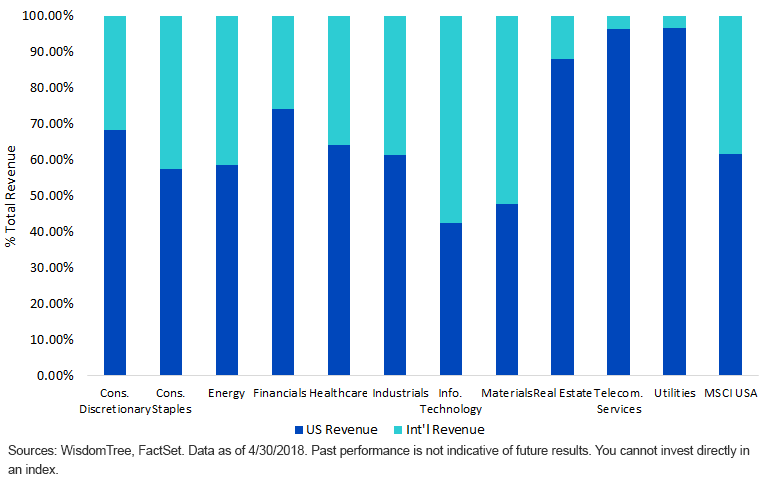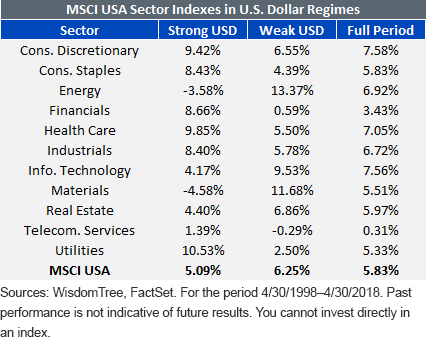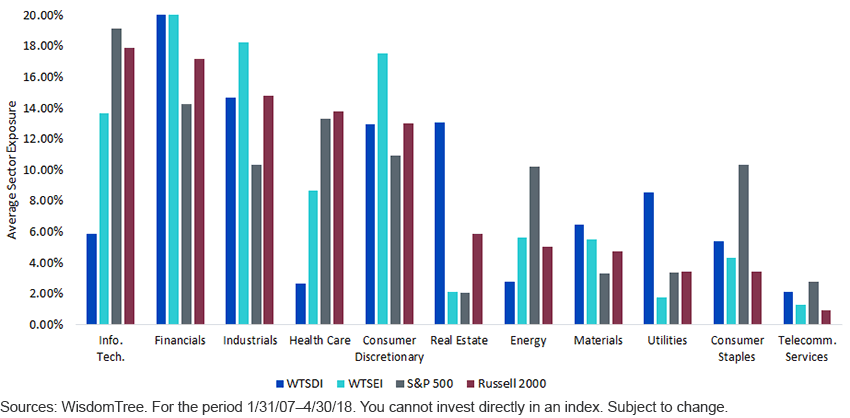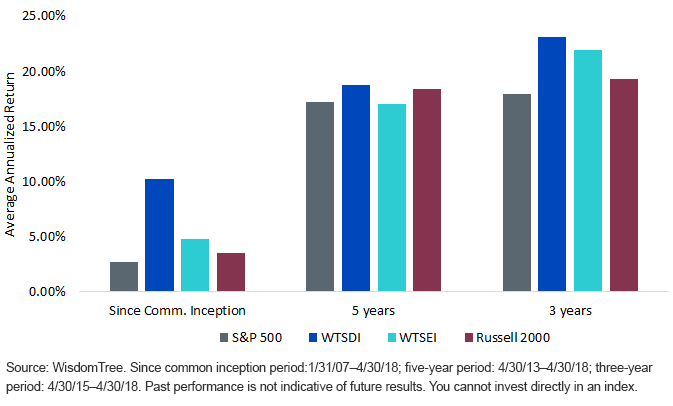How a Strengthening U.S. Dollar Affects Equity Returns


Movement in the U.S. dollar can be a headwind or a tailwind for earnings of U.S.-based companies. A company’s sensitivity depends proportionately on how much business it conducts internationally. In the chart below, we can see that, aggregately, firms in sectors such as Information Technology and Materials generate more than 50% of their revenue internationally and are therefore more sensitive to currency movements. On the other hand, companies in the Telecommunication Services and Utilities sectors, which are heavily exposed to the domestic market, tend to be relatively immune.
MSCI USA Sector Indexes: Current Geographic Revenue

Defining periods of U.S. dollar weakness and strength using trends in the moving averages for the ICE U.S. Dollar Index (DXY)1 allows us to see how sectors have behaved during the different regimes. The table below shows how different sectors within the MSCI USA Index performed over the past 20 years. We can see how domestically focused sectors outperformed the broad MSCI USA Index during periods of U.S. dollar strength, while more exporting-focused sectors beat when the dollar weakened. We can also see how sectors with a domestic focus have been less sensitive to movement in the currency, and therefore their returns show a smaller dispersion from one regime to another (such is the case for Real Estate and Utilities). On the other side, returns of exporter-focused sectors such as Materials and Energy show a larger deviation when the dollar moves.

In today’s economy, large-cap companies tend to be among the most globalized, conducting business activities in almost every country in the world, while small-cap companies focus on their domestic market. Evidence of this is that, on average, the large-cap-focused S&P 500 Index gets 61% of its revenue from the U.S., while the small-cap-focused Russell 2000 Index derives 79% of its revenue from domestic business. This domestic focus is also reflected in the different sector composition small-cap indexes have compared with their large-cap counterparts because they tend be over-weight in the more domestic sectors.
The WisdomTree U.S. SmallCap Dividend Index (WTSDI), which weighs dividend-paying small-cap companies according to their aggregate share of indicated dividends to be paid, and the WisdomTree U.S. SmallCap Earnings Index (WTSEI), which weighs profitable small-cap firms by their proportionate share of total aggregate earnings, magnify these tilts deviating from traditional market-cap weighting. The table below shows the difference in average sector exposures over the past 11 years for WTSDI, WTSEI, S&P 500 and the Russell 2000.
Average Sector Exposure

These sector tilts and domestic focus can help explain performance during different macroeconomic regimes. Below, we focus on how WisdomTree’s U.S. small-cap strategies—WTSDI and WTSEI —have performed when the U.S. dollar strengthens across different time periods.
WisdomTree’s Small-Cap Strategies: Returns When U.S. Dollar Strengthens

Looking at this chart, we can see that during periods of U.S. dollar strength, WTSDI and WTSEI have performed better than the S&P 500 Index and have also had an edge versus the broader small-cap benchmark, the Russell 2000 Index.
The last time the market experienced a strengthening U.S. dollar was from the middle of 2014 through the end of 2016, with DXY appreciating 10.12% annually. During this period, the WisdomTree SmallCap Dividend and Earnings Indexes outperformed the S&P 500 Index, which rose 7.70% on an annual basis, by 264 and 51 basis points (bps), respectively. WTSDI and WTSEI also outperformed the Russell 2000 Index by 356 and 143 bps annually, respectively.2
After depreciating in 2017, the dollar recently has reversed this trend and rallied more than 5%3 since February. If the dollar is to continue strengthening, investors with an income objective may want to consider exposure to the WisdomTree U.S. SmallCap Dividend Fund (DES), which tracks our domestically focused and defensively positioned WTSDI. Investors who are looking for a larger exposure to cyclical sectors in a rising interest rate environment may want to consider adding the WisdomTree U.S. SmallCap Earnings Fund (EES), which tracks WTSEI, to the equity portion of their portfolio.
1Defining strengthening and weakening months for the dollar using trends in the 50-day simple moving average for DXY and confirming the classification by looking at trends in the 50-day and 100-day centered moving averages.
2Source: Bloomberg. Data as of 5/21/2018.
3Source: Bloomberg. Data as of 5/21/2018.
Important Risks Related to this Article
There are risks associated with investing, including possible loss of principal. Foreign investing involves special risks, such as risk of loss from currency fluctuation or political or economic uncertainty. Funds focusing their investments on certain sectors and/or smaller companies increase their vulnerability to any single economic or regulatory development. This may result in greater share price volatility. Please read each Fund’s prospectus for specific details regarding the Fund’’ risk profile.
The Global Industry Classification Standard (“GICS”) was developed by and is the exclusive property and a service mark of MSCI Inc. (“MSCI”) and Standard & Poor’s (“S&P”), a division of The McGraw-Hill Companies, Inc., and is licensed for use by WisdomTree Investments, Inc. Neither MSCI, S&P nor any other party involved in making or compiling the GICS or any GICS classifications makes any express or implied warranties or representations with respect to such standard or classification (or the results to be obtained by the use thereof), and all such parties hereby expressly disclaim all warranties of originality, accuracy, completeness, merchantability and fitness for a particular purpose with respect to any such standard or classification. Without limiting any of the foregoing, in no event shall MSCI, S&P, any of their affiliates or any third party involved in making or compiling the GICS or any GICS classifications have any liability for any direct, indirect, special, punitive, consequential or any other damages (including lost profits), even if notified of the possibility of such damages

Alejandro Saltiel joined WisdomTree in May 2017 as part of the Quantitative Research team. Alejandro oversees the firm’s Equity indexes and actively managed ETFs. He is also involved in the design and analysis of new and existing strategies. Alejandro leads the quantitative analysis efforts across equities and alternatives and contributes to the firm’s website tools and model portfolio infrastructure. Prior to joining WisdomTree, Alejandro worked at HSBC Asset Management’s Mexico City office as Portfolio Manager for multi-asset mutual funds. Alejandro received his Master’s in Financial Engineering degree from Columbia University in 2017 and a Bachelor’s in Engineering degree from the Instituto Tecnológico Autónomo de México (ITAM) in 2010. He is a holder of the Chartered Financial Analyst designation.

